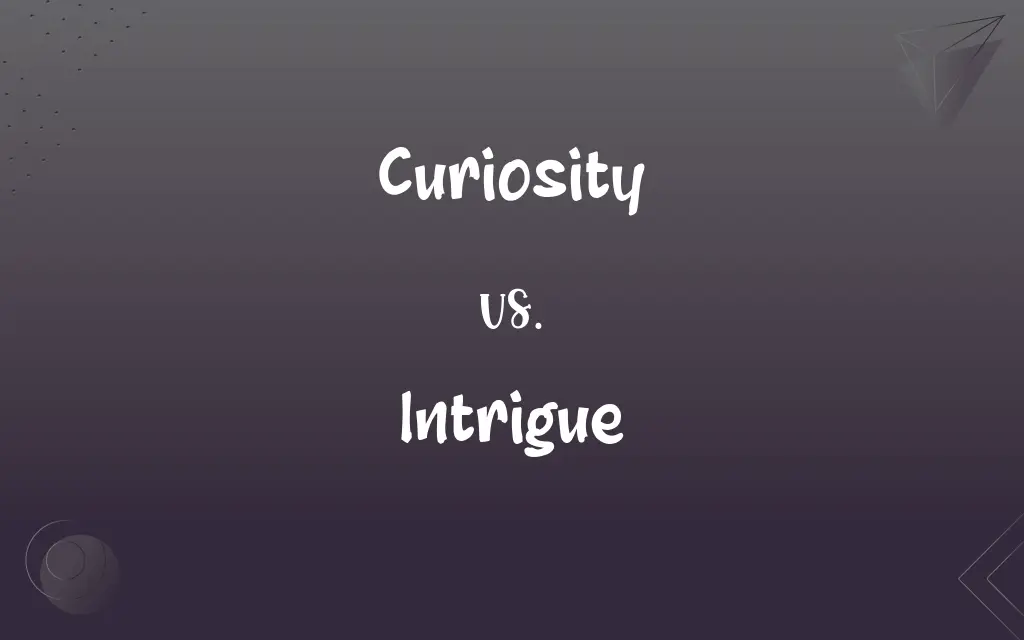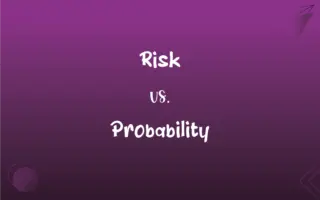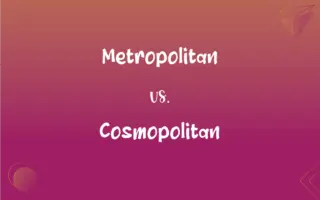Curiosity vs. Intrigue: What's the Difference?
Edited by Harlon Moss || By Janet White || Published on December 14, 2023
Curiosity is a desire to learn or know about something; intrigue involves arousing interest or fascination, often with mysterious or complex qualities.

Key Differences
Curiosity is the desire or inclination to learn, discover, or understand new things. It is a fundamental aspect of human nature, driving exploration and learning. Intrigue, on the other hand, refers to a state of fascination or interest, often sparked by something mysterious, unusual, or complex.
Curiosity can be considered a more general and innate quality, often leading to exploration and inquiry in a wide range of subjects or ideas. Intrigue, however, usually arises from specific circumstances or qualities that are particularly captivating or mysterious, compelling deeper investigation.
Curiosity often leads to seeking knowledge or understanding, while intrigue might involve a more emotional or psychological engagement, often linked with suspense, secrecy, or complexity. Curiosity can exist without intrigue, as it may be directed at more straightforward or mundane matters.
In practical terms, curiosity is what drives scientists and researchers in their studies, seeking to understand and explain. Intrigue, however, is more often associated with narratives, stories, and situations that hold an element of mystery or suspense, drawing people in.
Curiosity is a more universally experienced emotion, common in everyday life from childhood onwards. Intrigue, however, might be experienced less frequently, often associated with specific events, stories, or situations that have an element of the unexpected or unknown.
ADVERTISEMENT
Comparison Chart
Nature
Desire to learn or know
Interest sparked by mystery or complexity
Origin
Innate, general inclination
Specific, often due to mysterious qualities
Emotional Engagement
Intellectual, seeking knowledge
Emotional, psychological, often with suspense
Common Contexts
Research, learning, everyday life
Narratives, complex situations, mysteries
Frequency of Experience
Common and universal
Less frequent, linked to specific events
ADVERTISEMENT
Curiosity and Intrigue Definitions
Curiosity
A trait of being inquisitive or questioning.
Their curiosity about nature led to many outdoor adventures.
Intrigue
Arouse interest or fascination.
The mystery novel's plot intrigued her.
Curiosity
A desire to learn or know about something.
Her curiosity led her to study astronomy.
Intrigue
Generate curiosity through complexity or suspense.
The enigmatic character added intrigue to the story.
Curiosity
An interest in exploring new ideas.
His curiosity about different cultures was insatiable.
Intrigue
Involvement in or the creation of a mysterious situation.
The intrigue surrounding the lost treasure was captivating.
Curiosity
Inclination towards investigation and discovery.
The child's curiosity made her a keen observer.
Intrigue
Captivate with something mysterious or complex.
The ancient ruins intrigued the archaeologist.
Curiosity
Eagerness to know or understand.
Curiosity about the ocean's depths drove the exploration.
Intrigue
Engage with a sense of wonder or mystery.
The artist's unusual style intrigued the critics.
Curiosity
A desire to know or learn.
Intrigue
A secret or underhand scheme; a plot.
Curiosity
A desire to know about people or things that do not concern one; nosiness.
Curiosity
An object that arouses interest, as by being novel or extraordinary
Kept the carved bone and displayed it as a curiosity.
Curiosity
A strange or odd aspect.
Curiosity
(Archaic) Fastidiousness.
Curiosity
Inquisitiveness; the tendency to ask and learn about things by asking questions, investigating, or exploring.
Curiosity
A unique or extraordinary object which arouses interest.
He put the strangely shaped rock in his curiosity cabinet.
Curiosity
(obsolete) Careful, delicate construction; fine workmanship, delicacy of building.
Curiosity
The state or quality or being curious; nicety; accuracy; exactness; elaboration.
When thou wast in thy gilt and thy perfume, they mocked thee for too much curiosity.
A screen accurately cut in tapiary work . . . with great curiosity.
Curiosity
Disposition to inquire, investigate, or seek after knowledge; a desire to gratify the mind with new information or objects of interest; inquisitiveness.
Curiosity
That which is curious, or fitted to excite or reward attention.
We took a ramble together to see the curiosities of this great town.
There hath been practiced also a curiosity, to set a tree upon the north side of a wall, and, at a little hieght, to draw it through the wall, etc.
Curiosity
A state in which you want to learn more about something
Curiosity
Something unusual -- perhaps worthy of collecting
FAQs
Can Curiosity be developed?
Absolutely, it can be nurtured and developed through exposure to new experiences.
What is Curiosity?
A desire to learn or know about something.
How does Curiosity affect learning?
It enhances learning by motivating individuals to explore and understand new concepts.
Can Curiosity be harmful?
In rare cases, excessive curiosity can lead to risky behavior or invasion of privacy.
Can Curiosity lead to innovation?
Yes, as it drives the desire to explore and create new things.
What's the difference between Intrigue and curiosity?
Intrigue is about creating curiosity, often with a sense of mystery or conspiracy.
Is Curiosity a natural trait?
Yes, it's a natural human trait, often observed from early childhood.
What are the benefits of Curiosity?
It leads to increased knowledge, creativity, problem-solving skills, and overall life satisfaction.
What's the difference between Curiosity and interest?
Curiosity is a broader desire to know, while interest is more about specific topics.
Does everyone have the same level of Curiosity?
No, it varies from person to person.
How is Curiosity expressed?
Through questions, exploration, research, and trying new things.
How is Intrigue used in literature?
It's used to create suspense and hold the reader's attention.
How do you create Intrigue?
By presenting something mysterious, unusual, or unexpected that piques curiosity.
Does Intrigue have a cultural aspect?
Yes, what is considered intriguing can vary across different cultures.
Can Intrigue be negative?
Yes, if it involves manipulation or deceit.
What does Intrigue mean?
It refers to arousing interest or curiosity, often through mystery or complexity.
Is Intrigue always intentional?
Often, but it can also arise unintentionally in complex or ambiguous situations.
How is Intrigue viewed in a social context?
It can be seen as exciting, but sometimes suspicious or untrustworthy.
Is Intrigue essential in storytelling?
It's not essential but is often used to enhance engagement in a story.
Can Intrigue be used in marketing?
Absolutely, it can attract and retain consumer interest.
About Author
Written by
Janet WhiteJanet White has been an esteemed writer and blogger for Difference Wiki. Holding a Master's degree in Science and Medical Journalism from the prestigious Boston University, she has consistently demonstrated her expertise and passion for her field. When she's not immersed in her work, Janet relishes her time exercising, delving into a good book, and cherishing moments with friends and family.
Edited by
Harlon MossHarlon is a seasoned quality moderator and accomplished content writer for Difference Wiki. An alumnus of the prestigious University of California, he earned his degree in Computer Science. Leveraging his academic background, Harlon brings a meticulous and informed perspective to his work, ensuring content accuracy and excellence.







































































